 Petzlover
Petzlover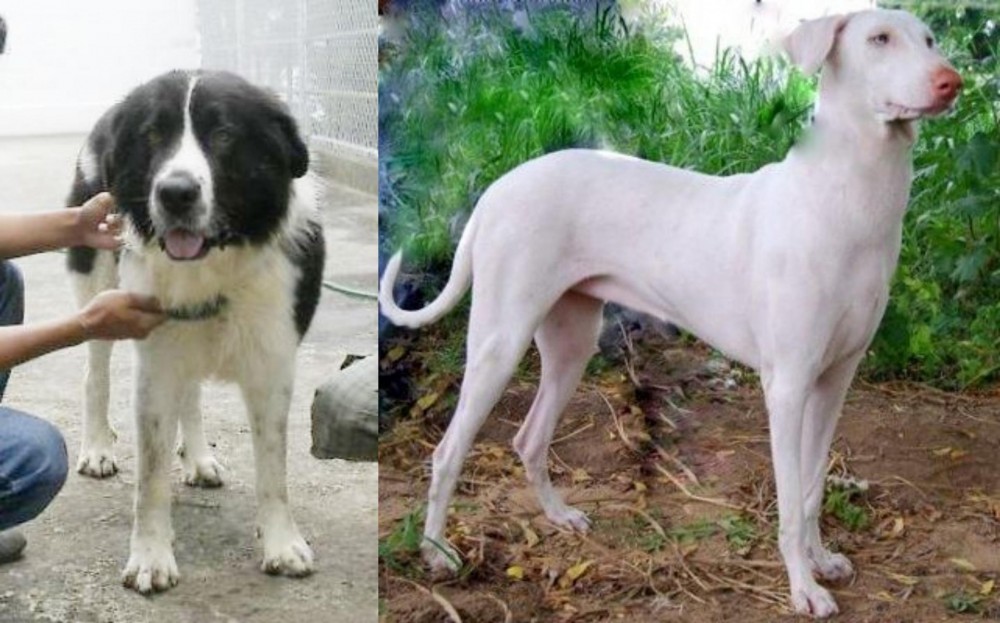 Mucuchies is originated from Venezuela but Rajapalayam is originated from India. Both Mucuchies and Rajapalayam are having almost same height. Mucuchies may weigh 36 kg / 80 pounds more than Rajapalayam. Both Mucuchies and Rajapalayam has same life span. Both Mucuchies and Rajapalayam has same litter size. Both Mucuchies and Rajapalayam requires Low Maintenance.
Mucuchies is originated from Venezuela but Rajapalayam is originated from India. Both Mucuchies and Rajapalayam are having almost same height. Mucuchies may weigh 36 kg / 80 pounds more than Rajapalayam. Both Mucuchies and Rajapalayam has same life span. Both Mucuchies and Rajapalayam has same litter size. Both Mucuchies and Rajapalayam requires Low Maintenance.
 The Mucuchies are a breed born in the Venezuelan mountains, in the late 1700s. They are rare today but were popular in the mountains for hundreds of years. They are believed to be a cross between the dogs brought by the Spanish Conquistadors in the 14th and 15th centuries and the local dogs. However, by the 1960s this rare breed was close to extinction.
The Mucuchies are a breed born in the Venezuelan mountains, in the late 1700s. They are rare today but were popular in the mountains for hundreds of years. They are believed to be a cross between the dogs brought by the Spanish Conquistadors in the 14th and 15th centuries and the local dogs. However, by the 1960s this rare breed was close to extinction.
Bred primarily as herders and watchdogs, their ancestry likely included the Algerian Mastiff, the Spanish Mastiff, the Great Pyrenees, and the Atlas Shepherd, otherwise known as the Aidi. The early development of the Mucuchies is attributed to Wilender Ferrari, DVM. At the time, Simon Boliva was fighting for Venezuelan independence in the city of Mucuchies. He adopted a member of the breed and named it for the city. The name stuck as the name for the breed.
Later in this timeframe, the Mucuchies was crossbred with the Pyrenean Mastiffs that friars brought to the Andes from their monasteries. With them, they also brought the sheep for the dogs to herd and guard. During the 1920s the breed spread throughout the country, but by the beginning of the 1960s there was a major decline in the breed. This was partly due to changes in culture and lifestyle in the Andes.
In 1961 a Mucuchies club was formed for the breed preservation and the breed was formally named the National Dog of Venezuela. The club was disbanded in the mid-1960’s and this led the breed to the edge of extinction. By 2008 there was another major push to save the breed. This effort came from the government who wanted to preserve the breed. In 2008, they created the Fundacion Nevado and sent six Mucuchies to the Waraira Repano Cable Car System in the El Avila National Park so that the dogs would be in a climatic environment as similar to the Andes mountain as possible. This was successful and the program was increased by Venezuelan President Hugo Chavez.
As the breed continued to develop the shepherding instincts were lost and the guarding aspects were strengthened. This left today’s Mucuchies as a breed of gentle, active dogs with strong characters and a loving disposition. They are gentle with their families but protective and aggressive with strangers. They are the only native breed of Venezuela and currently, there are programs in the mountains to re-establish and strengthen them.
In addition to their name for the town of Mucuchie, the breed is also called the Paramo’s Dog or the Snowy. These programs exist because in Venezuela they are near extinction once again. This is the result of inbreeding and more cross-breeding, this time with larger dogs like St. Bernards. Thus, the continued efforts by the Nevado Foundation with the assistance of the government to restore the original Mucuchies breed to Venezuela.
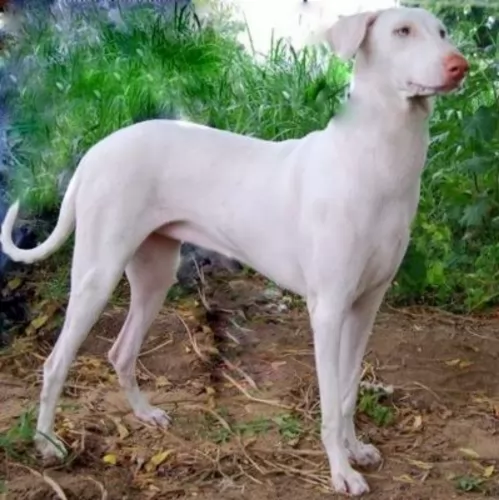 The Rajapalayam dog hails from India, from the small town of Rajapalayam in Tamil Nadu.
The Rajapalayam dog hails from India, from the small town of Rajapalayam in Tamil Nadu.
Known also as the Poligar Hound, this Indian Sighthound has been the companion of royalty in Southern India.
Though the breed dates back a few hundred years, the developers of the breed brought about an albino dog. This Indian breed dog is almost on the verge of extinction. This is a pity as he is a splendid dog. Breeding centers have been set up to prevent the dog disappearing altogether.
 The appearance of the Mucuchies is that of a breed of large dogs who stand two feet at the shoulder and can weight one hundred pounds. They have a deep chest, heads that are wedge-shaped and skulls shaped like domes. Their muzzles are straight, and their nostrils are large on their black nose. The Mucuchies have dark eye and eyelids along with ears that are triangular in shape and medium in size. Their lips are black but this and he has a well-developed ruff.
The appearance of the Mucuchies is that of a breed of large dogs who stand two feet at the shoulder and can weight one hundred pounds. They have a deep chest, heads that are wedge-shaped and skulls shaped like domes. Their muzzles are straight, and their nostrils are large on their black nose. The Mucuchies have dark eye and eyelids along with ears that are triangular in shape and medium in size. Their lips are black but this and he has a well-developed ruff.
They are large, sturdy dogs with a grand appearance and tremendous energy. Their neck is strong, short and very muscular with wide shoulders and a straight back. The tail is much longer than their hocks and it is shaped like a fan and he raises it when he is alerted. They have a short, thick coat and most are white or white with gray, honey or black. This is a very attractive breed.
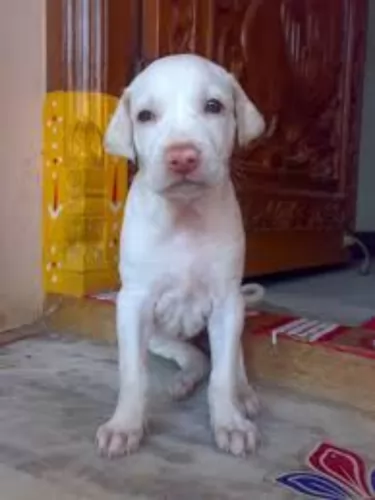 This is a large dog, graceful and elegant standing at between 65–75cm and weighing 22 to 25kg.
This is a large dog, graceful and elegant standing at between 65–75cm and weighing 22 to 25kg.
This is a hound dog, lean and muscular and will rely on good exercise to keep him in tip top working condition.
He is somewhat heavier than other sighthounds with a deep chest and long straight legs. He is a low maintenance dog with the white coat being short and fine. The ears are floppy ad the tail is slim and long and sometimes held up and curved.
The Rajapalayam has always been used for hunting wild boar, and today he makes a good guard- and watchdog. He needs a lot of space and exercise and isn’t suited to living in small spaces in the city.
He is a loving dog and becomes loyal and devoted towards his owner, being essentially a one-person dog. They tend to be aggressive and aloof with strangers.
Training and socialization will be important for this intelligent dog if you want him to behave around people. He doesn’t particularly get on well with other pets in the home, but training and socialization can change this.
 Good with children and very good with their own families. Might be a little standoffish with others.
Good with children and very good with their own families. Might be a little standoffish with others.
They no longer have the strong herding instinct but are outstanding guard dogs.
Yes but need land to run in. Don’t put this giant dog in an apartment. You will both be miserable.
Very intelligent and their ability and willingness to learn is very good.
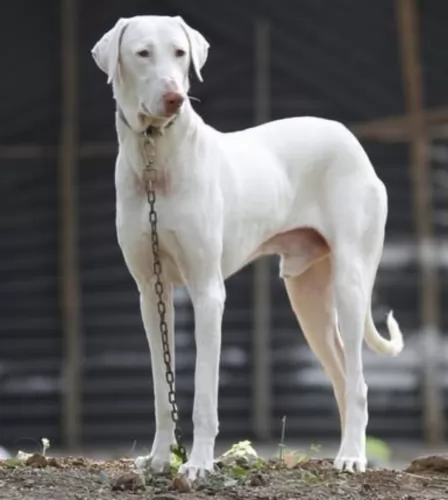 A Rajapalayam dog has always been a hunter and this makes him an excellent watchdog, always on the look out for intruders.
A Rajapalayam dog has always been a hunter and this makes him an excellent watchdog, always on the look out for intruders.
The Rajapalyam has always been a dog deeply attached and loyal to his owners.They are good family companions and pets and with so many good characteristics, one hopes that this dog will still be around for a long time.
 Because of their rarity and somewhat isolation, they do not have many genetic health concerns. They do however face at least a couple of the issues that most large dogs face.
Because of their rarity and somewhat isolation, they do not have many genetic health concerns. They do however face at least a couple of the issues that most large dogs face.
This can be a serious issue for such a large dog. It can cause arthritis and lameness.
This might be the biggest threat to the Mucuchies’ health. They are big dogs and if they injury limbs it can be quite serious.
The distension or inversion of the stomach and intestines is potentially fatal and must be treated immediately. Large dogs are prone to bloat and feeding schedules can go a long way in preventing it.
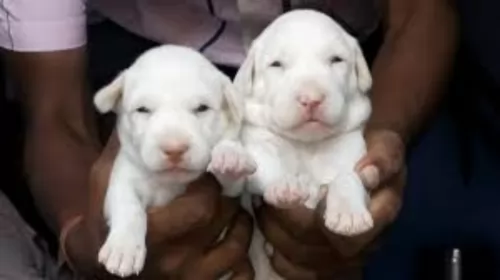 The Rajapalayam isn’t a fragile dog, and he can live to 10, 11 or 12 years of age. There are always a few things to look out for with him. With white dogs, there is always a high incidence of deafness. Puppies born with blue eyes are often deaf.
The Rajapalayam isn’t a fragile dog, and he can live to 10, 11 or 12 years of age. There are always a few things to look out for with him. With white dogs, there is always a high incidence of deafness. Puppies born with blue eyes are often deaf.
White coated dogs, because of the piebald gene, are often affected by deafness. The piebald gene is because of an absence of melanocytes. These are cells which create pigment. When a dog is born without the genes to create melanocyte cells, a white hair coat and sometimes blue eyes are the result.
There are also skin problems associated with these all white dog breeds such as mange and dermatitis. Check him over for ticks and fleas.
 As mentioned in health concerns, feeding appropriately is critical to the Mucuchies’ health. Puppies need a high quality, large breed dry food 2-3 times per day at ½ cup each time. Don’t overfeed. Don’t exercise before or after eating to prevent bloat.
As mentioned in health concerns, feeding appropriately is critical to the Mucuchies’ health. Puppies need a high quality, large breed dry food 2-3 times per day at ½ cup each time. Don’t overfeed. Don’t exercise before or after eating to prevent bloat.
The adult Mucuchies should eat at least twice a day for a total of two and one-half cups. So, you might feed one and ¼ cup at each meal. Again, it is critically important that you don’t overfeed. Don’t feed before or after strenuous exercise and don’t let your Mucuchies eat too quickly in order to avoid bloat.
This is a large dog with generally very good health. His stamina and heart will impress you.
The Mucuchies is not an active inside dog, but he is a large dog that needs daily exercise. They need to be able to run or at least to trot. A large yard or dog bark is necessary. However, this big, double coated dog hates the hot weather and needs a cooler climate. Winter is fine with him. Don’t overwork them while they are growing. Walks are the best exercise for this breed.
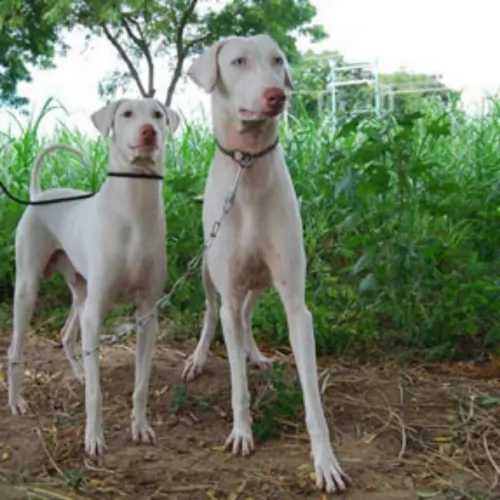 The short coat does shed so he will need to be brushed once or twice a week.
The short coat does shed so he will need to be brushed once or twice a week.
You will also need to follow a regular grooming program with this dog, checking inside his ears for infection, checking his eyes for discharge and checking inside his mouth for bad, rotting teeth. Teeth- and gum disease aren’t just about losing a tooth - bad teeth and gums can cause a host of health issues for other body parts like the heart and kidneys.
His toe nails too wll require clipping to prevent splitting and chipping.
Provide your pet with lots of exercise – a walk every day, a run in the park off his leash as well as ball and frisbee games.
You can’t ever become lax with giving your pet good food. Good, wholesome food promotes health and longevity.
There are some good commercially manufactured dog foods which are wonderfully convenient – you just want to be sure its the high quality ones full of vitamins and minerals.
Also, provide him with uncomplicated, home-made dog food too. Boiled chicken, brown rice or pasta, sweet potatoes, carrots and spinach, all chopped up and mixed in twice a week with the dry kibble will ensue health and contentment.
Try and add some raw meat in as well. This simple diet plan will be gentle on your pet’s digestive system.
Make sure he always has a bowl of fresh, cool water available to him.